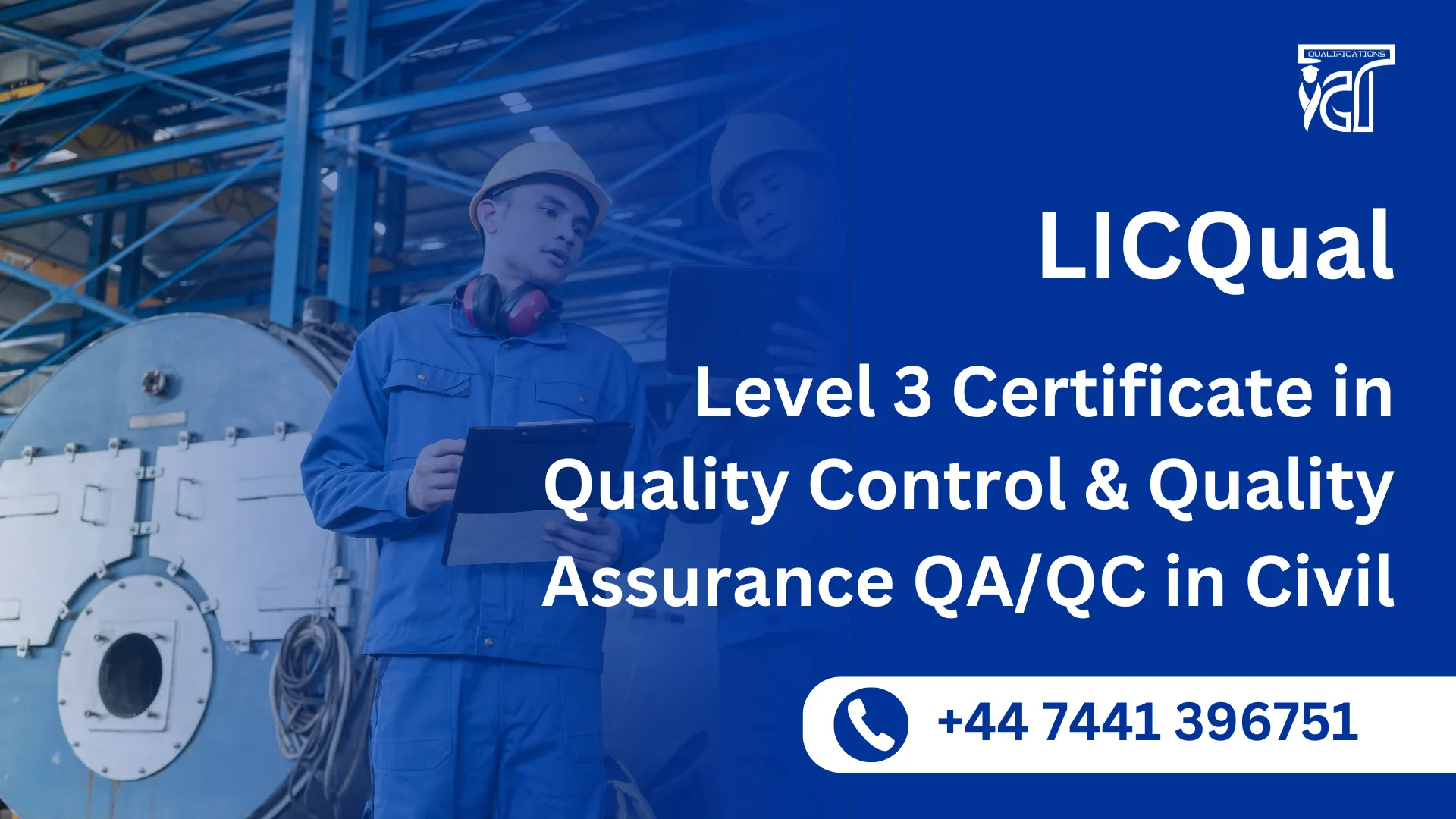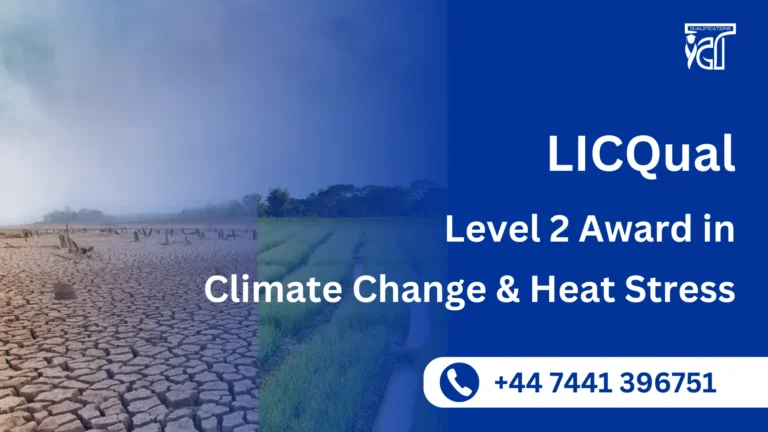In the construction and civil engineering industries, maintaining strict quality standards is essential for ensuring safety, efficiency, and compliance. The LICQual Level 3 Certificate in Quality Control and Quality Assurance (QA/QC) in Civil is designed for professionals who wish to gain in-depth knowledge and practical skills to oversee and implement quality assurance processes in civil construction projects. This Ofqual-regulated qualification provides learners with the expertise to ensure that civil engineering projects meet high standards of quality, safety, and regulatory compliance.
Whether you’re a project manager, site supervisor, or aspiring quality control professional, this course will equip you with the necessary skills to succeed in a quality assurance role within the civil sector.
The LICQual Level 3 Certificate in QA/QC in Civil focuses on the practical application of quality control and quality assurance in civil construction. This course is ideal for professionals working in or aiming to work in construction project management, site supervision, or civil engineering roles.
The assignment-based format of the course allows for flexible, practical learning, making it perfect for busy professionals. With a focus on real-world application, this qualification teaches you how to ensure compliance with industry standards, conduct inspections, and manage quality control activities in civil projects.
This course is accredited by Ofqual, ensuring it meets UK standards and is internationally recognized by employers in the construction industry.You will gain hands-on skills that can be directly applied in the workplace, enhancing your ability to perform in real-world construction projects.
The LICQual Level 3 Certificate in Quality Control and Quality Assurance (QA/QC) in Civil offers a highly specialized and practical qualification designed to help professionals in the civil construction industry improve their quality management skills. With flexible, assignment-based learning and a curriculum tailored specifically for the civil sector, this course prepares you for a rewarding career in quality control and assurance.
Enroll today and enhance your career in civil quality control with the LICQual Level 3 Certificate in QA/QC in Civil!
LICQual Level 3 Certificate in Quality Control and Quality Assurance QA/QC in Civil
Following are the mandatory units of LICQual Level 3 Certificate in Quality Control and Quality Assurance QA/QC in Civil
| Unit Ref# | Unit Title | Credit | GLH |
| LICQ2200142-1 | Introduction to Quality Control and Quality Assurance in Civil Engineering | 4 | 20 |
| LICQ2200142-2 | Quality Management Systems and Standards | 4 | 20 |
| LICQ2200142-3 | Quality Planning and Documentation | 4 | 20 |
| LICQ2200142-4 | Quality Inspection and Testing in Civil Projects | 4 | 20 |
| LICQ2200142-5 | Statistical Process Control and Quality Improvement | 4 | 20 |
| LICQ2200142-6 | Non-Conformity Management and Corrective Actions | 4 | 20 |
GLH (Guided Learning Hours) and TQT (Total Qualification Time) are terms commonly used in vocational qualifications to help define the amount of time a learner is expected to spend on their studies.
1. GLH (Guided Learning Hours)
GLH refers to the number of hours a learner spends being directly taught, supervised, or supported during their course. This includes the time spent in activities such as:
- Classroom instruction
- Practical workshops
- One-on-one tutoring or mentoring sessions
- Online learning sessions with tutor support
In other words, GLH represents the time that learners are actively engaged with their instructors or learning activities.
2. TQT (Total Qualification Time)
TQT represents the total amount of time a learner is expected to invest in completing a qualification, including:
- GLH (Guided Learning Hours): Time spent on direct learning, as explained above.
- Self-Directed Learning: This includes time spent on independent study, research, assignment completion, preparation for exams, and any other work the learner does outside of direct teaching hours.
TQT is a broader measure that includes all the time required to achieve the qualification. It helps learners and employers understand the overall commitment required for the qualification.
Key Differences Between GLH and TQT:
- GLH focuses on direct learning with guidance or supervision.
- TQT includes GLH as well as independent study time and other learning-related activities.
Example:
If a qualification has a TQT of 600 hours and a GLH of 250 hours, it means the learner should spend 250 hours in direct learning (classroom, online, or tutor-led sessions) and 350 hours on independent study or research.
By the end of this course, learners will be able to:
Unit 1: Introduction to Quality Control and Quality Assurance in Mechanical Engineering
By the end of this unit, learners will be able to:
Introduction to Quality Control and Quality Assurance in Civil Engineering
- Understand the core principles of Quality Control (QC) and Quality Assurance (QA) in civil engineering, including their importance in ensuring the quality and safety of construction projects.
- Recognize the differences between QA and QC, and how each contributes to the successful delivery of civil engineering projects.
- Develop a foundational knowledge of the roles of QA/QC in managing risks, compliance, and the overall quality of civil engineering works.
Quality Management Systems and Standards
- Gain an in-depth understanding of various Quality Management Systems (QMS) such as ISO 9001 and other international and national standards used in civil engineering.
- Learn how to implement and maintain a QMS that aligns with industry best practices, ensuring the continual improvement of quality in civil engineering projects.
- Understand how to interpret and apply relevant standards and regulations to ensure compliance and quality in civil engineering processes.
Quality Planning and Documentation
- Develop skills in creating comprehensive Quality Plans that outline the processes, standards, and methodologies used to ensure quality throughout civil engineering projects.
- Learn the importance of accurate and thorough documentation in maintaining quality control, including the preparation of quality manuals, inspection reports, and audit records.
- Understand how effective documentation supports project transparency, compliance, and facilitates continuous improvement in quality assurance practices.
Quality Inspection and Testing in Civil Projects
- Gain practical skills in performing inspections and testing to assess the quality of materials, workmanship, and construction processes in civil engineering projects.
- Learn the various testing techniques used to evaluate the structural integrity and safety of civil engineering components such as concrete, steel, and asphalt.
- Understand how to interpret testing results and use them to ensure that civil engineering projects meet the required quality standards.
Statistical Process Control and Quality Improvement
- Understand the application of Statistical Process Control (SPC) tools and techniques in monitoring and improving the quality of civil engineering processes.
- Learn how to use data-driven approaches to identify areas for improvement, reduce variability, and optimize project outcomes.
- Develop the ability to analyze quality data and make informed decisions to enhance efficiency, productivity, and the overall quality of civil engineering projects.
Non-Conformity Management and Corrective Actions
- Learn how to identify, document, and manage non-conformities (deviations from project specifications) that arise during civil engineering projects.
- Understand the process of implementing corrective actions to address non-conformities and prevent recurrence, ensuring that projects meet quality standards and deadlines.
- Develop skills in conducting root cause analysis to determine the underlying issues of non-conformities and apply effective solutions for continual quality improvement.
Benefits of the LICQual Level 3 Certificate in Quality Control and Quality Assurance (QA/QC) in Civil
1. Ofqual-Regulated and Globally Recognized
The LICQual Level 3 Certificate is Ofqual-regulated, ensuring it meets high educational standards. This recognition makes it globally accepted and highly respected by employers, giving you an edge in the competitive civil construction industry.
2. Specialized Knowledge in Civil QA/QC
This course is tailored specifically for the civil construction industry, providing specialized knowledge in quality control and quality assurance. You will learn how to implement quality management systems (QMS) and ensure that civil engineering projects meet safety, regulatory, and quality standards.
3. Practical, Hands-On Learning
The course emphasizes practical skills that can be immediately applied in real-world construction projects. You will gain experience in conducting inspections, creating reports, identifying non-conformities, and proposing corrective actions, all of which are essential for a career in QA/QC.
4. No Exams – Assignment-Based Assessment
The LICQual Level 3 Certificate is entirely assignment-based, meaning you’ll be assessed through real-world tasks and assignments instead of exams. This allows for more practical learning and a less stressful learning experience, making it ideal for working professionals.
5. Flexible Online Learning
With online delivery, this course offers flexibility to study at your own pace, from anywhere in the world. Whether you’re currently employed or balancing other commitments, you can learn at your convenience without interrupting your professional responsibilities.
6. Increased Career Opportunities
Upon completion of the course, you’ll be qualified for a variety of roles within the civil construction sector, including:
- QA/QC Inspector
- Quality Assurance Officer
- Site Supervisor
- Construction Project Coordinator
- Compliance Officer
This opens up new career paths in both the public and private sectors, offering job stability and career growth.
7. Enhanced Employability and Professional Credibility
Earning this recognized certification enhances your professional credibility and makes you stand out to potential employers. It demonstrates your commitment to quality, regulatory compliance, and continuous improvement—qualities highly valued in the civil construction industry.
8. Comprehensive Understanding of Quality Standards
You’ll gain in-depth knowledge of key international standards such as ISO, BS, NEC, and IEC codes. Understanding these quality standards will equip you to ensure that projects meet required specifications, improving both the efficiency and safety of construction operations.
9. Health, Safety, and Environmental Compliance
This course includes comprehensive training on health, safety, and environmental considerations in QA/QC, ensuring that learners are fully equipped to manage risks on construction sites. You’ll gain a thorough understanding of HSE guidelines to ensure compliance and safety throughout project lifecycles.
10. Pathway for Further Professional Development
Completing this certificate opens up pathways for further qualifications, including advanced diplomas and certifications in quality management, project management, and specialized auditor training. This provides a clear progression route for those wishing to take on more senior roles within the industry.
The LICQual Level 3 Certificate in QA/QC in Civil not only enhances your technical skills but also positions you for long-term success in the growing field of civil construction quality assurance.
This diploma is ideal for:
- This course is ideal for professionals in the civil engineering and construction industries who want to specialize in Quality Control (QC) and Quality Assurance (QA) practices.
- LICQual Level 3 Certificate in Quality Control and Quality Assurance QA/QC in Civil is designed for individuals seeking to gain or formalize their expertise in ensuring the quality, safety, and compliance of civil engineering projects.
- The LICQual Level 3 Certificate in QA/QC in Civil Engineering is suitable for quality inspectors, quality managers, project engineers, and professionals in construction and infrastructure development who wish to enhance their knowledge of QA/QC systems.
- This course is perfect for individuals with a technical background in civil engineering or construction who want to deepen their understanding of quality management systems and their application in real-world projects.
- LICQual Level 3 Certificate in Quality Control and Quality Assurance QA/QC in Civil is also ideal for those looking to move into QA/QC roles within civil engineering firms or construction companies, particularly those overseeing large-scale projects such as bridges, roads, and buildings.
- The course benefits those aiming to meet industry-recognized standards, improve project efficiency, reduce defects, and ensure compliance with quality and safety regulations in civil engineering.
- LICQual Level 3 Certificate in Quality Control and Quality Assurance QA/QC in Civil is highly valuable for professionals looking to advance their careers by gaining a globally recognized certification in QA/QC practices tailored for the civil engineering sector.
Entry Requirements
Register Now
Qualification Process
Qualification Process for the LICQual Level 3 Certificate in Quality Control and Quality Assurance QA/QC in Civil
- Self-Assessment:
Begin by evaluating your eligibility to ensure you meet the qualification requirements, including work experience, knowledge, and language proficiency. - Registration:
Complete your registration by submitting the required documents, including a scanned copy of a valid ID, and paying the registration fee. - Induction:
An assessor will conduct an induction to confirm your eligibility for the course and explain the evidence requirements. If you do not meet the criteria, your registration will be canceled, and the fee will be refunded. - Assignmnets & Evidence Submission:
Provide all assignmnets and the necessary evidence based on the assessment criteria outlined in the course. If you are unsure of the required evidence, consult with the assessor for guidance on the type and nature of evidence needed. - Feedback and Revision:
The assessor will review your submitted evidence and provide feedback. Evidence that meets the criteria will be marked as “Criteria Met,” while any gaps will be identified. You will be asked to revise and resubmit if needed. - Competence Evidence:
Submit final evidence demonstrating that all learning outcomes have been met. This evidence will be marked as “Criteria Met” by the assessor once it is satisfactory. - Internal Quality Assurance (IQA):
The Internal Quality Assurance Verifier (IQA) will review your evidence to ensure consistency, quality, and compliance with standards. - External Verification:
The IQA will submit your portfolio to LICQual External Quality Assurance Verifiers (EQA) for final confirmation. The EQA may contact you directly to verify the authenticity of your evidence. - Certification:
Upon successful completion of all checks, LICQual will issue your official certificate, confirming that you have attained the LICQual Level 3 Certificate in Quality Control and Quality Assurance QA/QC in Civil.







